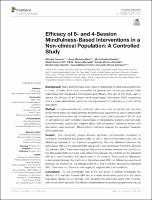Por favor, use este identificador para citar o enlazar este ítem:
https://repositorio.usj.es/handle/123456789/310
| Título : | Efficacy of 8- and 4-session mindfulness-based interventions in a non-clinical population: A controlled study |
| Autor: | Demarzo, Marcelo



Montero-Marín, Jesús 

Puebla-Guedea, Marta 
Navarro-Gil, Mayte Teresa 

Herrera-Mercadal, Paola 
Moreno-González, Sergio 
Calvo Carrión, Sandra 

Bafaluy-Franch, Laura 
García-Campayo, Javier J. 

|
| Palabras clave : | Mindfulness; Intervenciones basadas en mindfulness; MBI; Programas abreviados; Bienestar |
| Fecha de publicación: | 8-ago-2017 |
| Editorial : | Frontiers Media S.A. |
| Citación : | Demarzo M, Montero-Marin J, Puebla-Guedea M, Navarro-Gil M, Herrera-Mercadal P, Moreno-González S, Calvo-Carrión S, Bafaluy-Franch L and Garcia-Campayo J (2017) Efficacy of 8- and 4-Session Mindfulness-Based Interventions in a Non-clinical Population: A Controlled Study. Front. Psychol. 8:1343 |
| Descripción : | Background: Many attempts have been made to abbreviate mindfulness programmes in order to make them more accessible for general and clinical populations while maintaining their therapeutic components and efficacy. The aim of this study was to assess the efficacy of an 8-week mindfulness-based intervention (MBI) programme and a 4-week abbreviated version for the improvement of well-being in a non-clinical population. Method: A quasi-experimental, controlled, pilot study was conducted with pre-post and 6-month follow-up measurements and three study conditions (8- and 4-session MBI programmes and a matched no-treatment control group, with a sample of 48, 46, and 47 participants in each condition, respectively). Undergraduate students were recruited, and mindfulness, positive and negative affect, self-compassion, resilience, anxiety, and depression were assessed. Mixed-effects multi-level analyses for repeated measures were performed. Results: The intervention groups showed significant improvements compared to controls in mindfulness and positive affect at the 2- and 6-month follow-ups, with no differences between 8- vs. 4-session programmes. The only difference between the abbreviated MBI vs. the standard MBI was found in self-kindness at 6 months, favoring the standard MBI. There were marginal differences in anxiety between the controls vs. the abbreviated MBI, but there were differences between the controls vs. the standard MBI at 2- and 6-months, with higher levels in the controls. There were no differences in depression between the controls vs. the abbreviated MBI, but differences were found between the controls vs. the standard MBI at 2- and 6-months, favoring the standard MBI. There were no differences with regard to negative affect and resilience. Conclusion: To our knowledge, this is the first study to directly investigate the efficacy of a standard 8-week MBI and a 4-week abbreviated protocol in the same population. Based on our findings, both programmes performed better than controls, with similar effect size (ES). The efficacy of abbreviated mindfulness programmes may be similar to that of a standard MBI programme, making them potentially more accessible for a larger number of populations. Nevertheless, further studies with more powerful designs to compare the non-inferiority of the abbreviated protocol and addressing clinical populations are warranted. |
| URI : | https://repositorio.usj.es/handle/123456789/310 |
| ISSN : | 16641078 |
| Aparece en las colecciones: | Artículos de revistas |
Ficheros en este ítem:
| Fichero | Descripción | Tamaño | Formato | |
|---|---|---|---|---|
| Efficacy of 8- and 4-session mindfulness-based interventions in a non-clinical population.pdf | 278,77 kB | Adobe PDF |  Visualizar/Abrir |
Este ítem está sujeto a una licencia Creative Commons Licencia Creative Commons

